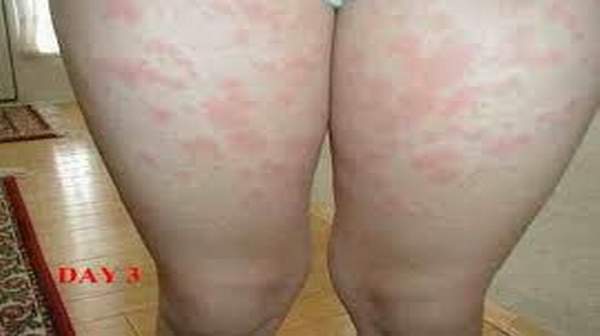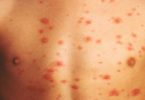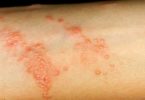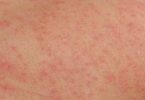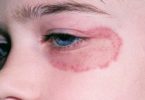What's in this article?
Mild Hiv Rash
One of the most challenging health threats to the world population is HIV/AIDS. With various symptoms occurring in different stages of this disease, HIV skin rash is one of the most prominent AIDS symptoms, that occurs in the later stages of HIV infection.
With threats of AIDS at its peak, knowing about HIV rash symptoms in men is important. It has to be noted that not any severe rash can be a cause of AIDS but being aware of this symptom is important, especially, if you’re a person who has a high risk of getting infected with virus.
HIV Rash Symptoms in Men
Skin rashes are mostly observed due to allergy from certain substances, chemicals, cosmetics etc. Sometimes, they may occur due to overdose of medications, or due to consumption of wrong medicines.
However, during AIDS disease, HIV rash, that is a skin rash occurs significantly. HIV rash symptoms in men are known to occur in the later stages of AIDS disease.
Once a person is infected by the HIV, acute HIV symptoms in men like unexplained weight loss, memory loss, weaknesses, diarrhea and pain in joints are observed after a period of 1 or 2 months. Once these symptoms subside, they may not occur for 9 – 10 years and later they may again resurface accompanied by HIV rash. In fact, when AIDS symptoms again start to appear, HIV rash symptoms in men are one of the earliest symptoms to be observed.
People who’re seeking AIDS treatment and consume anti – HIV medications have also been reported to develop skin rashes. It has to be noted that various anti – HIV medications can cause mild to severe skin rashes. Appearance of some skin rashes after consuming anti – HIV medications, may be normal, and they go after the use of medications is stopped. However, some early symptoms of HIV rash may aggravate in severe forms. Hence, medical intervention is necessary.
Severe skin rashes can cause damage to the skin and hence they must be addressed immediately by a doctor. Generally, severe skin rashes can lead to consequences that may even cause death of the patient. Stevens – Johnson syndrome (SJS) and Toxic Epidermal Necrolysis (TEN) are two different forms of skin rashes that occur in the advanced stages of AIDS. And these are most evident HIV rash symptoms in men.
Some of the most common symptoms of HIV rash in men are poor skin that peels off easily, resulting in sores. In certain cases, it can lead to blisters in organs like mouth, eyes, genitals and other areas of the body where there is a presence of moisture. Some may also observe flat, raised and red spots on various areas of the body.
Treatment for HIV Rash Symptoms in Men
In case of mild HIV skin rash, one must contact a doctor. Ensure that you’ve discussed with the doctor before making any plans to change the medication in your treatment plan, on your own. When HIV rash symptoms in men have taken a severe form, then the doctor may stop his prescribed medications and you’ll be asked to be admitted in the hospital.
Moreover, as per requirements, you’ll be administered treatment for intravenous fluids and antibiotics etc. Signs and symptoms of HIV rash on wrists may include sores and blisters amounting to discomfort in carrying out daily chores. In case, you consume special medications like NNRTIs or non-nucleoside reverse transcriptase inhibitors and are experiencing skin rash symptoms.
Ensure that you stop consuming these medications based on the advice of your medical expert. The HIV can result in various types of infections such as impetigo, and skin cancers in extreme cases. Treating HIV rash symptoms in men requires proper consultation with doctors, since skin problems can only compound the threat already posed due to AIDS.
symptom in HIV people do not always caused by infection. Antiretroviral drugs (ARV) can cause skin manifestation, such as HIV rashes in HIV infected people. Drug rashes are skin abnormalities as the body react to certain medication. The type of rash that occurs depends on the type of drug that is causing it and how’s the body react to it. HIV rashes can range from mild to severe.
Zidovudine is one of antiretroviral drugs (ARV). Zidovudine prevents HIV replication. Treatment with Zidovudine may result in hyperpigmentation of the nails, oral mucosa, and skin. About 1 month after Zidovudine therapy, the color of the proximal white portion of nail change to bluish. Then, hyperpigmented longitudinal nail bands appear. Cutaneous hyperpigmentation may also be noted due to Zidovudine treatment.
Nevirapine is also one of antiretroviral drugs (ARV). Nevirapine can cause severe rash like Steven-Johnson syndrome. Mostly rashes occur within the first 4-6 weeks of treatment. Nevirapine should be discontinued in patients with severe rash or any rash accompanied by constitutional symptoms.

